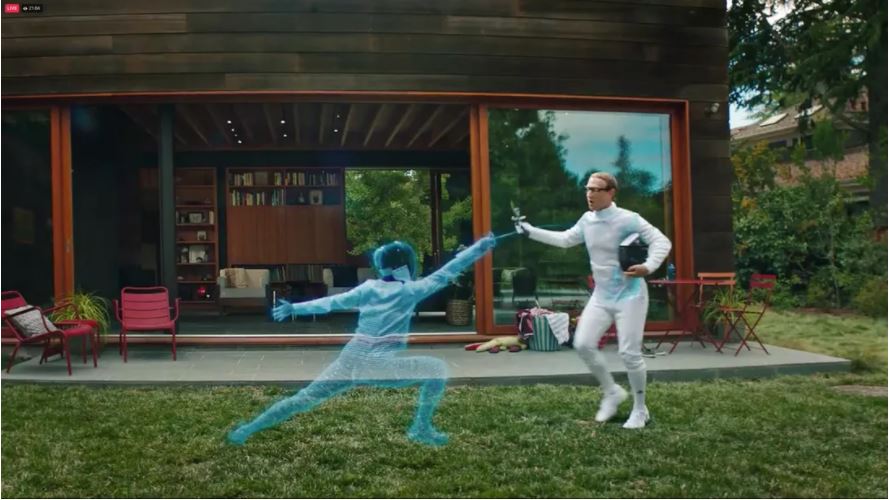One of the most popular virtual reality apps recently boosted its quest to become a significant player in the next big tech trend, the metaverse.
Rec Room, a Seattle-based social game business formed by former Microsoft HoloLens employees, announced Monday that it had raised $145 million. This values it at $3.5 billion, higher than the almost $3 billion Facebook agreed to pay for VR firm Oculus in 2014. Rec Room’s latest capital will be used to expand the company and hire more staff. It was led by Coatue Management and included current investors Sequoia Capital, Index Ventures, and Madrona Venture Group.
People signed on to play games like pinball and laser tag and race in automobile rallies while conversing with other players, according to Rec Room CEO Nick Fajt, who co-founded the company in 2016. Though the corporation wouldn’t reveal how many individuals used its platform each month, it did say that it had increased by more than 450 percent in November compared to the same month the previous year.
Some of the company’s growth, according to Fajt, was due to the company’s apps being added to iPhones in 2019 and Android phones this summer. But, according to him, users had also built more than 12 million rooms in which to play games or communicate. “It all boils down to having an excellent community,” Fajt explained.
However, the corporation will confront competition in its quest for expansion. It’s the latest in a long line of social-oriented programs to thrive in the COVID-19’s constant solitude. Other apps, such as the world-building games Minecraft and Roblox and the online battle game Fortnite, became safe havens for survivors of the outbreak. Early in the epidemic, gaming network traffic spiked, and it continued to rise.
People are also devoting a substantial amount of time to those games. When Roblox went public last year, the business said that 31.1 million individuals used the site daily, up more than 80% from the same period in 2019. A year later, in November, Roblox announced that the figure had risen to 47.3 million users.
The rise of digital worlds where individuals can interact has prompted much of the tech sector to use “metaverse” to characterize them. For example, epic Games, the creators of Fortnite, have explored the concept when detailing how their popular fighting game has hosted actual music concerts, celebrity meetups, and even movie evenings. Other corporations have jumped on the metaverse bandwagon, with leaders from Microsoft, Match, Coinbase, and even Disney discussing how they’re creating their own.
Mark Zuckerberg, a co-founder of Facebook, was so enthusiastic about the metaverse that he renamed his firm Meta in October. “We are a firm that produces technology to link people,” he stated at the time, “and the metaverse is the next frontier, much like social networking was when we started.”
In 2016, when Meta introduced its Rift VR headsets, virtual reality was at its zenith of popularity. Investors poured money into VR startups, while giant corporations like Sony, Google, HTC, and Microsoft discussed their VR plans. However, unlike smartphone sales after the launch of Apple’s iPhone, people’s anticipation for virtual reality to become the next big thing dwindled.
All of that has begun to alter due to the pandemic, which has pushed us to rely on technology. Professor Joost van Dreunen of NYU Stern School of Business and author of One Up: Creativity, Competition, and the Global Business of Video Games said he’s become less skeptical of social worlds as he’s seen the world adapt to social distancing and isolation by holding funerals on Zoom and children’s birthday parties in Roblox.
“It might be entirely social,” he explained, “where my kid logs in on a rainy day and plays with his buddies.”

The metaverse’s creation
Rec Room sees the unexpected surge in interest in technology as both a major potential and a warning that it will face competition from some of the industry’s largest companies. Meta has already been working on Horizon Worlds, a free experience that, like Rec Room, allows individuals to hang out and play games in a shared virtual area.
One of the things that will set Fajt’s startup apart from Horizon is that it is not bound to Meta’s platform. Instead, it’s free on Android, iPhones, PC, Sony’s PlayStation, and Microsoft’s Xbox consoles, as well as in virtual reality. It also does not rely on advertising for revenue, instead making money by selling virtual products such as different character looks.
It appears to be working so far. In Rec Room, console and VR users spend an average of more than two hours, while mobile device users spend an hour. Last year, Roblox stated that its users spend an average of 2.6 hours playing the game.
“If you go to Rec Room, you’re going to stay there for a while,” Fajt explained.
Rec Room also intends to make a name for itself in the community. The company established strict rules against abuse and poor behavior, including training on utilizing the company’s tools to mute or even vote out those who were causing problems. Rec Room has also begun experimenting with automated voice moderating, which will use a combination of community reporting, human moderators, and computerized techniques to detect offenders.
“A large part of it is being proactive,” Fajt said, adding that when someone first joins the platform, the business moderates more heavily to set the tone. However, he also doesn’t want to make the same mistakes that have resulted in mass harassment campaigns, disinformation, and other potentially harmful conduct that Meta, Twitter, YouTube, and other social media firms are currently dealing with.
There’s still a lot of work to be done. For example, according to disclosures by Frances Haugen, a former Facebook employee who shared redacted internal communications with the Securities and Exchange Commission, Congress, and a consortium of news organizations and reporters, including CMT reporter, a Facebook employee once told colleagues they weren’t having a “good time” using Rec Room on the Oculus Quest headset because someone was chanting a racial slur. When the Facebook employee attempted to report the “bigot,” Fajt stated that his staff had previously banned someone who had used the same racist insult at the exact moment.
Rec Room also wants to strengthen its moderation methods as the company grows, to appropriately ban users who break the rules as soon as possible.
He went on to clarify, “We didn’t state Rec Room is an open community where you can do whatever you want.” “We have a code of conduct and expectations for what we will and will not tolerate as far as material is concerned.”
Hopefully, those efforts will result in experiences that people will want to return to, according to Fajt. “It’s one of the most significant obstacles to overcome. When we consider the next stage for us, we realize that it will be much more than a game.”


